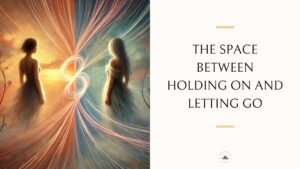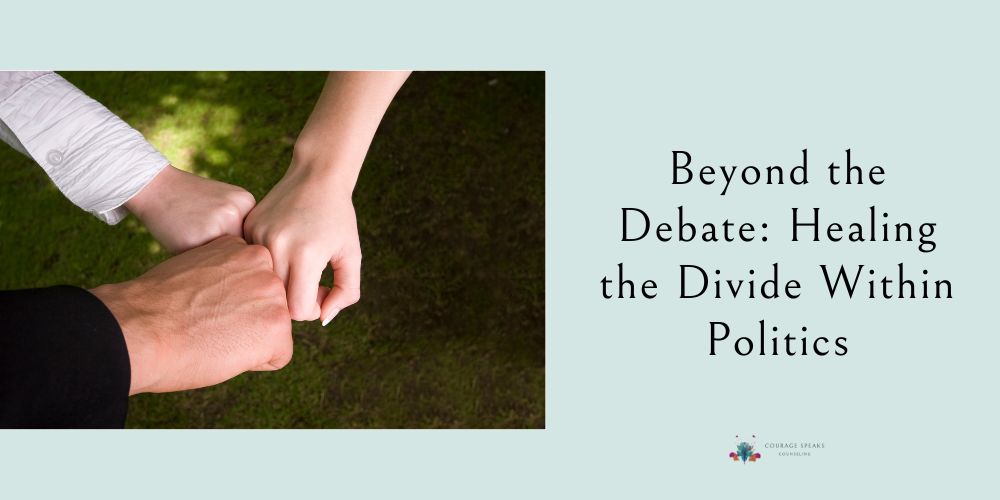In today’s political climate, conversations often feel charged, with tensions running high and divisions growing deeper. We struggle to understand how people we care about can hold such opposing views, and it’s easy to feel frustrated, angry, or even consider distancing ourselves. But what if the real conflict isn’t about politics at all? What if it’s about something deeper—something personal that gets stirred up inside us?
Consider how we handle differences in other areas of our lives. You may disagree with a friend on how to raise kids, or you might have a neighbor with a completely different lifestyle. Yet, these differences don’t seem to threaten your relationship as much as politics does. So why does politics feel different?
The key lies in understanding how our inner selves respond in these moments. Within each of us, there are different versions of ourselves that have developed over time, often in response to challenges or past experiences. These selves hold specific beliefs, roles, and fears. When a political disagreement arises, it can trigger a younger version of ourselves that feels threatened, rejected, or protective, making the conversation feel deeply personal and high-stakes.
These reactions aren’t wrong or bad, but they offer an invitation: to pause, reflect, and understand which part of us is being activated. When we recognize and work with these selves, we can engage more calmly and compassionately—even when we disagree with someone else.
An Exercise for Navigating Political Differences Using Our Parts
1. Pause and Recognize the Self That’s Reacting:
When you feel yourself getting upset during a political conversation, take a moment to pause. Notice the strong emotions that come up. Is it anger? Frustration? Disbelief? This may be a sign that a younger version of yourself is reacting. Ask yourself, “Which part of me feels triggered by this conversation?”
2. Name the Younger Self:
Once you recognize the emotion, try to identify which version of yourself is reacting. It might be a teenage part—a part of you that feels the need to defend your values. Or it could be the 5 year old self —the part of you that gets anxious about conflict. By naming this younger version of yourself, you create some space between the reaction and your overall sense of self.
3. Understand This Self’s Role:
Spend a moment listening to this version of yourself. What do they need right now? What are they trying to do for you in this moment? What are they worried about? Often, this younger self is reacting based on past experiences that somehow feel similar. They are trying to keep you safe or make sure your voice is heard. You may realize that your reaction is about more than the political disagreement—it might be about feeling unseen, dismissed, or misunderstood, emotions that may trace back to earlier points in your life.
4. Give the Younger Self What they Need:
As you visualize this younger part and ask them what they need, do your best to meet their need now, in this moment. It may be a hug, validation, understanding, to be heard or seen, to feel safe. As you give this part what they need stay with it until you notice a shift in your body to a more calm relaxed state.
5. Return to the Conversation with Clarity:
After meeting this younger parts needs you can return to the conversation. You may still disagree, but now you’re doing so from a grounded, centered place, rather than from a place of emotional reaction. You may even find yourself more curious about the other person’s perspective, recognizing that they, too, have their own selves reacting. This shift allows you to see the person, not just their political stance.
Applying This Practice Beyond Politics:
This exercise isn’t just for political disagreements. We encounter differences and tensions in many areas of life—family dynamics, friendships, even work relationships. By pausing to recognize which version of ourselves is reacting, we can bring more understanding and compassion to every interaction.
This isn’t about changing someone else’s mind or convincing them to see things your way. It’s about understanding that we all have different parts of ourselves shaped by our experiences, and those parts influence how we see the world. When we start working with those selves—both in ourselves and understanding them in others—it becomes easier to accept differences, even in political conversations.
We manage to navigate differences in many other parts of life. Why should politics be any different? By learning to pause, recognize, and respond to the parts of ourselves that get activated, we open the door to more meaningful conversations. Instead of fighting over who’s right or wrong, we can engage with curiosity, empathy, and a deeper appreciation for our shared humanity.
When we make space for our differences, we don’t just heal political divides; we create room for deeper connection across every part of life. And that’s the real work we’re here for—to see and accept each other, not in spite of our differences, but because of them.
Embracing Shadows, Illuminating Hope,
Chelsey Fjeldheim, LCSW
Empowering Souls on the Path of Healing
Copyright © 2024 Chelsey Fjeldheim, Courage Speaks Counseling




